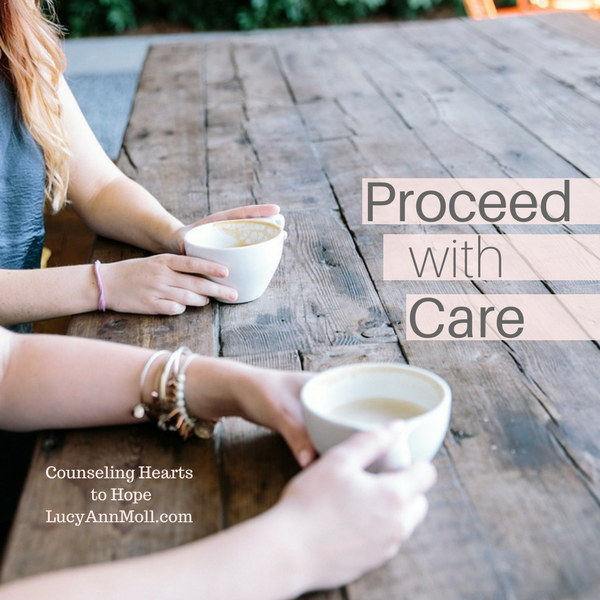Caring in crisis: The Lord calls you to love one another as He has loved you. In this article by biblical counselor and guest writer Betty-Anne Van Rees, she outlines important steps in caring for people in all types of crisis. Here article appeared first here at The Biblical Counseling Coalition website and is used with permisison.

As Jesus’ ministry on earth was drawing to a close, He had a conversation with His closest followers as they ate together in the upper room. In the preceding minutes, He had foretold His betrayal, then watched as Satan entered Judas who left that intimate gathering and went out into the night to betray the Son of God. A singularly unique context in world history, this is the moment Jesus chose to offer these words:
A new commandment I give to you, that you love one another; as I have loved you, that you also love one another. By this all will know that you are my disciples, if you have love for one another. (John 13:34-35).
One Truth with Infinite Application
It’s not complicated but it is complex; Jesus delivered one concise instruction with millions of applications. God’s followers will be identifiable as we demonstrate the love that we have seen and experienced in our Savior. It is a love demonstrated through death; death to self and all of the desires, expectations, effort, and even perceived needs that we have. It is also a love seen in living; living for the love of God and the needs of others.
I invite you to briefly think with me about what living this commandment will look like when we love people who are experiencing traumatic circumstances – sudden loss, devastating betrayal, a life-altering medical diagnosis, acts of violence or violation. These are the things that shake our very foundations and can make the future appear as one vast blank slate.
How Did Jesus Love?
1. Jesus entered in.
He is God who became man. Hebrews tells us that this means He understands (Heb. 4:15). When we love as He has loved us, we won’t stand at a distance trying to serve from our own understanding. We will draw near to those we seek to serve, so that what we offer truly gives grace in the moment. When people in our world face these types of catastrophic events, we need to step in – and stay in. Click & Tweet!
Job’s friends started so well. Their silent presence acknowledged the depth of Job’s pain and the mystery of the hand of God in this world. Take time to sit in the ash heap with your hurting friend. Let them know of your commitment to journey with them – even for them – as long as they need.
While you wait, prayerfully listen for needs. People in crisis may be struggling with the basic necessities of life – food, clothing, shelter. It is probable that their new reality will require them to navigate worlds they don’t understand – legal, medical, governmental. With the magnitude of the needs, it will most likely be unrealistic for one person to serve in all of the ways needed. Gather a team who can knowledgeably navigate the different areas of service, and offer your friend a coordinated plan for care that communicates confidence and the tender love of God.
2. While Jesus entered in to understand what it is like to be us, He was not uncertain about our ultimate need.
Jesus met many earthly needs along the way but never lost sight of the true need. Click & Tweet!
We needed God and Jesus came as the means to open the way to God. Similarly, we will demonstrate His love best by remembering that those we seek to love need far more than our human effort; they need God. Our efforts are merely conduits of His beauty and grace to them. Do the work of love but never forget the heart of love; the gospel of God points to hope in the midst of deepest darkness.
3. Jesus followed.
He repeatedly indicated to His listeners that He, like us, was called to a role of submission. He loved perfectly by allowing the Father to determine His life choices. If we are going to love well, we will submit in humble obedience to the One who truly knows all things. We won’t offer what we believe is needed, nor will our own desires and expectations dictate our service.
It’s very likely that our friend doesn’t even know what they need – or if they do, they may be unable to articulate it. We will serve them best if we are in a posture of waiting on God for wisdom and then following in humble obedience as He leads.
Proceed Gently
In times of crisis, the wounds of the battle are raw. A “touch” from a friend that is not carefully considered can feel like the burn of rubbing alcohol. You may fail at times and if you do, be ready to acknowledge failure and ask for forgiveness.
By God’s grace, we don’t live in crisis all the time, and no two crises are the same and the people within a crisis are individuals. We will do well to approach the needs of a friend suffering traumatic circumstances with faith-filled, love-infused caution. At the same time, we hold on to the hope that God is near and tenderly working for His glory and the good of each of those touched by suffering.
Questions for Reflection
During times of personal crisis in your life, what has ministered most to you? What other applications to caring in crisis do you see in John 13:34-35?
Counseling Hearts to Hope,




